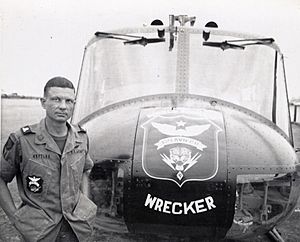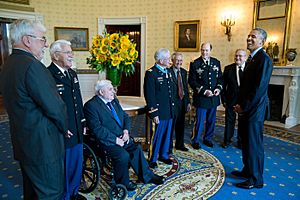Charles Kettles facts for kids
Quick facts for kids
Charles Kettles
|
|
|---|---|

Then Army Major Charles Kettles stands in front of a 121st Aviation Company UH-1H Huey helicopter during his second tour of duty in Vietnam in 1969.
|
|
| Birth name | Charles Seymour Kettles |
| Born | January 9, 1930 Ypsilanti, Michigan, U.S. |
| Died | January 21, 2019 (aged 89) Ypsilanti, Michigan, U.S. |
| Buried |
Highland Cemetery, Ypsilanti, Michigan
|
| Allegiance | United States |
| Service/ |
|
| Rank | |
| Commands held | 176th Aviation Company (Airmobile) (Light), 14th Combat Aviation Battalion |
| Awards | Army Commendation Medal with oak leaf cluster Valorous Unit Award Bronze star |
| Website | Official Website: https://www.army.mil/medalofhonor/kettles/ |
Charles Seymour Kettles (born January 9, 1930 – died January 21, 2019) was a brave American soldier. He was a lieutenant colonel in the United States Army. He received the highest military award, the Medal of Honor, for his amazing courage during the Vietnam War.
Contents
Early Life
Charles Kettles was born in Ypsilanti, Michigan, on January 9, 1930. He went to Michigan State Normal College. There, he studied engineering.
Military Service
Charles Kettles joined the United States Army when he was 21. After his basic training, he went to Officer Candidate School. He became an officer in the Army Reserve in 1953.
He learned to fly helicopters in 1954. He then served in places like South Korea, Japan, and Thailand. After his active duty, Kettles opened a car dealership. But he continued to serve in the Army Reserve.
In 1963, he volunteered for active duty again. He trained to fly the UH-1D "Huey" helicopter. In 1966, he was sent to South Vietnam. He served there from February to November 1967. He had a second tour in Vietnam from 1969 to 1970. Kettles retired from the Army in 1978.
Medal of Honor Story
Charles Kettles received the Medal of Honor on July 18, 2016. This was almost 50 years after his heroic actions. He was a flight commander with the 176th Aviation Company.
On May 15, 1967, soldiers from the 1st Brigade were attacked. They were in the Song Tra Cau riverbed in Vietnam. The enemy had many weapons and was hidden in tunnels. When Major Kettles heard about the attack, he volunteered to help.
He led six helicopters to bring more soldiers and supplies. They also went to pick up wounded troops. As they landed, heavy enemy fire hit their helicopters. Soldiers were hurt and killed before they could even get off.
The helicopters and soldiers were badly damaged. But Kettles refused to leave until all new soldiers and supplies were unloaded. He also made sure all wounded soldiers were safely on board. Then, he led his flight out of the battle zone.
Kettles knew how dangerous it was, but he went back to the battlefield. He brought more soldiers and landed in heavy fire. His gunner was badly wounded, and his helicopter was damaged. As he left, he was told his helicopter was leaking fuel. Even with the risk, he flew the damaged aircraft back to base.
Later that day, 40 soldiers and four of Kettles' own unit were stuck. Their helicopter had been shot down. Kettles volunteered to go back a third time. He led six helicopters, even though his company only had one working Huey left.
As they were leaving, Kettles was told that eight soldiers couldn't reach the helicopters. They were trapped by the intense enemy fire. Kettles bravely turned back to rescue them. He went alone, without any support from other aircraft or artillery.
The enemy focused all their fire on his single helicopter. It was hit by a mortar round. The tail, rotor blade, and windshields were all shattered. Small arms fire also hit his aircraft.
Despite the severe damage, Kettles kept control. He gave the eight trapped soldiers time to get on board. Even with his helicopter badly damaged, he skillfully flew it to safety. Without his amazing courage, those soldiers and his crew would not have survived.
In 1968, Kettles received the Distinguished Service Cross for these actions. Years later, in 2016, this award was changed to the Medal of Honor. This happened after a special law was passed.
President Barack Obama said that Major Kettles became their "John Wayne". But Obama added, "With all due respect to John Wayne, he couldn't do what Chuck Kettles did."
Later Life
After the Army, Charles Kettles finished his college degree. He also earned a master's degree in commercial construction. He helped create a program for Aviation Management at Eastern Michigan University. He taught there for a while. Later, he worked for Chrysler Pentastar Aviation until he retired in 1993. Charles Kettles lived in Ypsilanti, Michigan, and passed away there in 2019 at age 89.
Awards and Decorations
Charles Kettles received many awards for his service. Here are some of them:
 |
|||||
 |
|||||
| 3 Overseas Service Bars |
See also
 In Spanish: Charles Kettles para niños
In Spanish: Charles Kettles para niños


